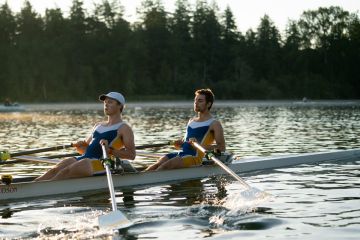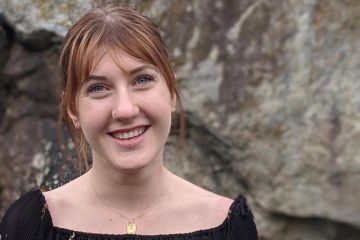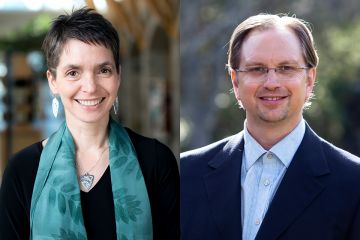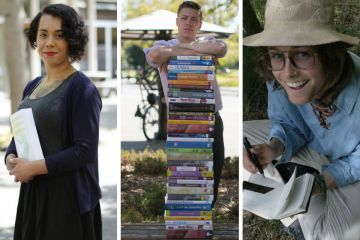Backgrounder: UVic’s 3M Scholars
(Note: Photos of each student are available in this Dropbox folder)
Cara Samuel
Samuel is a graduate student in UVic’s clinical psychology department, and wants to change the way the world views post-traumatic stress disorder. She chose UVic because she was impressed with its diversity, sexualized violence policy and strength in social justice issues.
Samuel’s passion for leadership and advocacy began while working in child protection and community mental health in Winnipeg, where she saw first-hand the impact of pervasive systemic oppression. She saw a role for herself in giving a voice to oppressed and marginalized people. “I want to make a difference in marginalized people’s lives,” she says.
For her 3M challenge, Samuel presented her concerns around privilege and exclusivity in processes around admission and scholarship awards at Canadian universities. She believes some of those processes end up inadvertently favouring students with more economic resources while excluding those with few.
“As a marginalized student, I am all too familiar with this struggle,” says Samuel. “I can’t even begin to describe what this feels like, to know that your peers not only have an unfair advantage, but also that no one seems to care—and in fact they are benefitting from your marginalization.”
Her eight proposed solutions included applying universities’ equity practices to the admission process; acknowledging all forms of learning and experience as valid criteria for admission; mandatory workshops for faculty and students on creating an inclusive and anti-oppressive environment; and a mandatory undergrad class on diversity and inclusivity.
She hopes to complete her PhD at UVic and eventually find work as a psychologist with Doctors Without Borders, “a dream since high school.”
Michael Graeme
Graeme came to UVic from Nelson after “hearing good things” about the programs he was interested in—anthropology and environmental studies. He will finish up his Bachelor of Arts in anthropology and environmental studies this month while attending a UVic summer field school in Peru.
“I've come to love UVic even more for all the decolonization initiatives happening here, as well as those for food security and waste diversion,” says Graeme, whose research focuses on deforestation in Ecuador. “I hope to bring what I learn back home to my hometown of Nelson one day.”
He says UVic’s School of Environmental Studies is at the forefront of the movement to connect students to their communities and bring research to reality, which was the challenge he brought to the 3M selection committee.
The ability for post-secondary education to integrate community action with learning goals not only allows students to develop as community leaders and active catalysts for creating tangible difference in the world, but it also helps students discover real-world application for their learning and build networks for their future career goals.
As the head of UVic’s Environmental Studies Student Association, Graeme helped spearhead a fundraiser last year for Mosqoy, a non-profit started in 2006 by another UVic environmental studies student, Ashli Akins, to support and empower the Quechua population in the Peruvian Andes.
“I hope to do what I can to help humans—including myself—get to a sustainable relationship with the earth and with each other. There are so many intervention points that arise in everyday life, and it seems UVic has set me up really well to confront them.”
Maxwell Nicholson
Nicholson begins his final year in UVic’s Bachelor of Science economics honours program this fall. He was planning a career as a pastry chef but realized after opening his own cake-making business in Grand Forks–Alathyia Cakes—that his true passion was to be an entrepreneur.
“I had competed in a provincial baking competition in BC,” recalls Nicholson. “At the end of the competition, I began to realize that while I loved the art of pastry, I was more in love with the entrepreneurial spirit that I had developed by starting the business.”
Nicholson appreciates the “UVic difference”—abundant student support, opportunities to get involved in leading-edge projects, a collaborative study environment. That collaboration was vital for his project that helped him catch the eye of the 3M selection committee, the problem of high textbook costs.
“In my studies, I was able to work closely with many of my professors, and ultimately collaborate with them for the open textbook project,” says Nicholson. “Unlike some other schools, where you feel like a number in a seat, at UVic it is very easy to seek and implement the changes you wish to see.”
Nicholson’s thoughts on leadership summon the philosophy of the late cultural anthropologist Margaret Mead, who once noted that the actions of a small group of thoughtful citizens not only can change the world, but are the only way to change it.
“It’s not watching, hoping or waiting. It’s taking the first step, and inspiring others to follow,” says Nicholson. “Leadership is realizing that you can’t do everything yourself. It is building partnerships with others who share common goals and collaborating to achieve results. This focus on action and collaboration are core to my style of leadership.”
In this story
Keywords: STLHE, student life, award, psychology, anthropology, economics, environmental studies
People: Cara Samuel, Maxwell Nicholson, Michael Graeme




